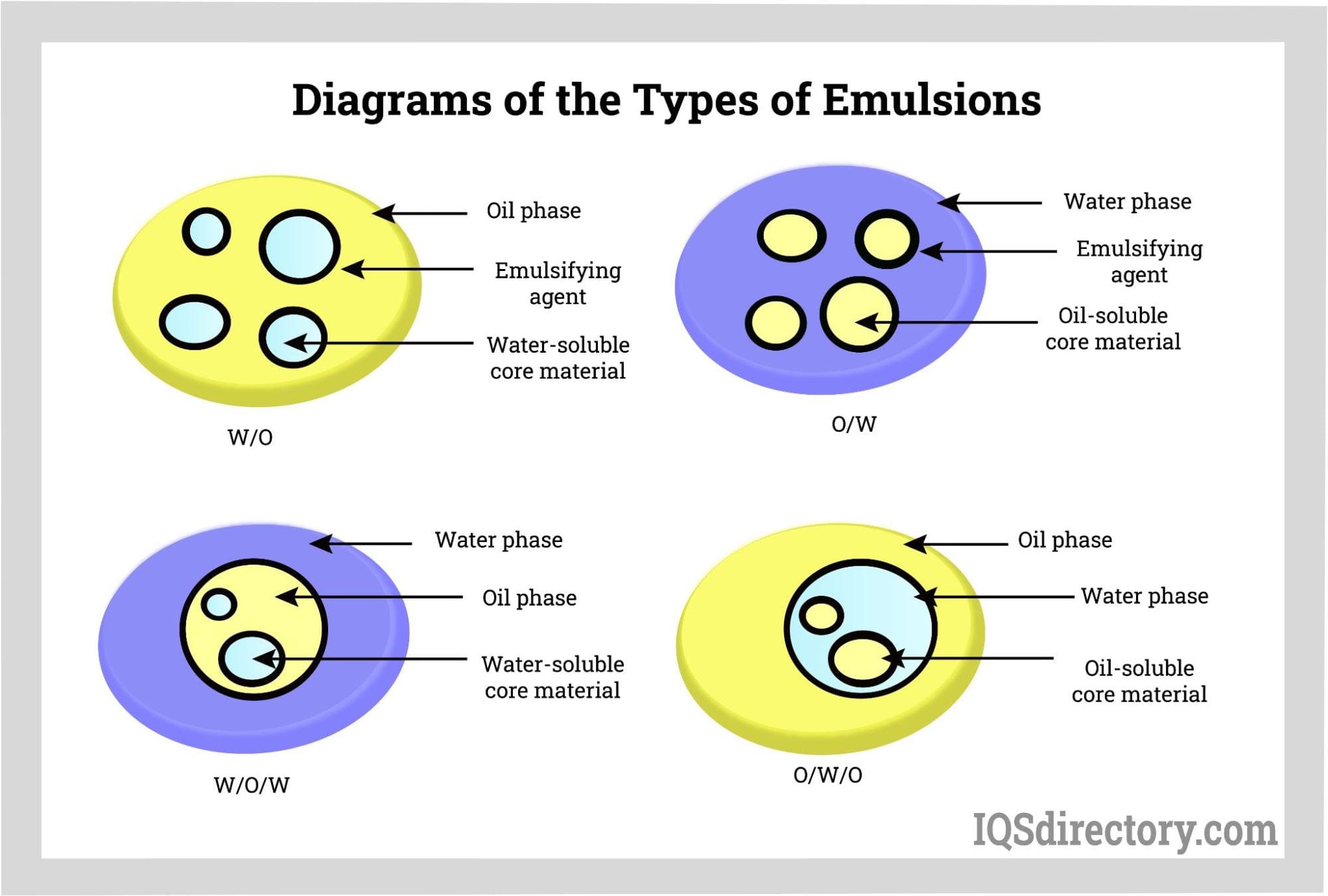Understanding Emulsifiers in Pharmaceutical Applications
Understanding Emulsifiers in Pharmaceutical Applications
Blog Article
The Science Behind Emulsifiers and Their Importance in Modern Production
Emulsifiers play an essential duty in modern-day production, acting as the unsung heroes that mix oil and water for a vast array of products. As consumer preferences change in the direction of cleaner tags, the demand for ingenious emulsifiers is expanding.
What Are Emulsifiers?
Emulsifiers are crucial representatives in the world of food and product manufacturing, acting as the adhesive that binds 2 otherwise immiscible liquids, like oil and water. Typical examples include lecithin located in egg yolks and soybeans, and mono- and diglycerides made use of in different processed foods.

When you whip up a salad clothing or indulge in a creamy treat, emulsifiers aid preserve that perfect texture. Without emulsifiers, numerous foods would separate, leading to unfavorable textures and flavors.
The Chemistry of Emulsification
When you blend oil and water, you could see they do not mix conveniently; that's where the chemistry of emulsification comes into play. To conquer this difficulty, emulsifiers are employed.
When you include an emulsifier, its particles position themselves at the oil-water interface, lowering surface tension and allowing the beads to mix. The emulsifier creates a protective layer around each bead, avoiding them from integrating back right into separate layers.
Kinds Of Emulsifiers
Numerous types of emulsifiers play vital roles in maintaining combinations of oil and water. Natural emulsifiers, like lecithin from egg yolks or soy, are obtained from plants and pets, making them preferred in food products.
On the various other hand, synthetic emulsifiers, such as mono- and diglycerides, are chemically engineered to improve security and life span. They're frequently utilized in refined foods and aesthetic items.
Additionally, you may stumble upon non-ionic, anionic, and cationic emulsifiers, each with distinct homes that affect their performance. Non-ionic emulsifiers, for instance, job well in a broad range of pH levels, while anionic emulsifiers have a tendency to perform much better in alkaline conditions. Recognizing these types can help you pick the appropriate emulsifier for your particular application.
Mechanisms of Emulsion Formation
Recognizing how solutions develop is necessary for creating steady blends of oil and water. Solutions take place when you distribute little beads of one liquid right into another immiscible liquid, such as oil in water. This process requires power, often supplied through frustration or blending. When you present an emulsifier, it reduces the surface area stress between the two fluids, enabling them to blend more easily.
The emulsifier particles have a hydrophilic (water-attracting) head and a hydrophobic (oil-attracting) tail. When you add an emulsifier, these particles prepare themselves at the oil-water interface. The hydrophilic heads connect with water, while the hydrophobic tails secure right into the oil. This creates a barrier that stabilizes the droplets, stopping them from coalescing.
Applications of Emulsifiers in Various Industries
Emulsifiers play a vital role throughout numerous industries, making your favored foods smoother and extra enjoyable. In cosmetics, they improve product structure and security, guaranteeing an enjoyable application experience. Plus, in drugs, they aid provide vital active ingredients properly, boosting total effectiveness.
Food Industry Makes Use Of
While you could not understand it, emulsifiers play a necessary function in the food market, boosting the texture, security, and rack life of several products. In baked products, emulsifiers enhance dough handling and retain dampness, resulting in a much better texture and expanded quality. By making sure uniformity and high quality, emulsifiers are considerable to providing the scrumptious items you appreciate every day, making them a vital active ingredient in contemporary food manufacturing.
Cosmetic Formulations Benefits
When it involves aesthetic solutions, emulsifiers are essential for producing products that feel elegant web and perform properly. They aid blend oil and water, making sure a smooth and stable consistency in creams, creams, and serums. You'll notice that emulsifiers boost product stability, avoiding separation and extending rack life. This indicates you can enjoy your preferred moisturizer without stressing over it going poor too promptly. In addition, emulsifiers enhance the application experience, enabling even distribution and far better absorption right into the skin. By utilizing emulsifiers, you also accomplish an even more attractive texture, making your cosmetics feel delightful on your skin. Generally, emulsifiers play an essential function in delivering premium cosmetic products that fulfill your elegance demands.
Drug Applications Overview
In the pharmaceutical sector, emulsifiers are necessary for creating efficient medicines. You'll find emulsifiers in different dose forms, like creams, lotions, and liquid suspensions, enhancing the bioavailability of medications.
The Effect of Emulsifiers on Item Quality

By making certain stable emulsions, you minimize the danger of wasting and extend rack life, inevitably conserving you time and money. You'll additionally find that emulsifiers can boost the bioavailability of energetic ingredients in your items, making them extra reliable for customers.
In addition, they enable you to produce cutting-edge formulations that satisfy diverse consumer needs. Whether you're crafting a creamy dressing or a lavish cream, emulsifiers are essential for accomplishing the preferred results. In other words, by recognizing and leveraging the influence of emulsifiers, you can significantly elevate the quality of your items.
Future Fads in Emulsifier Growth
As the need for cleaner labels and sustainable items increases, the advancement of brand-new emulsifiers is readied to progress substantially. You'll observe a shift in the direction of plant-based and natural emulsifiers, driven by consumer preferences for components that are eco-friendly and much less processed. Advancements in biotechnology will likely improve the functionality and performance of these emulsifiers, permitting manufacturers to produce stable solutions with fewer ingredients.
You could also see an increase in multifunctional emulsifiers that not just support solutions yet additionally improve taste, appearance, or nutritional worth. This pattern could streamline active ingredient checklists while enhancing item performance.
Additionally, with developments in nanotechnology, emulsifiers might be engineered at the molecular degree to accomplish unmatched security and effectiveness. Emulsifiers. As you check out these fads, you'll discover that the future of emulsifier development is not simply about performance, but also concerning accepting sustainability and transparency in components
Regularly Asked Inquiries
Are Emulsifiers Safe for Intake in Food Products?
Yes, emulsifiers are typically secure for usage in foodstuff. They've been extensively studied and authorized by food security authorities, so you can enjoy your preferred foods without fretting concerning their effect on your wellness.
Can Emulsifiers Be Derived From Natural Resources?
Yes, you can acquire emulsifiers from all-natural sources. Components like lecithin from egg yolks or soybeans and casein from milk prevail. These all-natural emulsifiers help support blends without artificial additives, making them prominent in various items.

Just How Do Emulsifiers Affect Shelf Life of Products?
Emulsifiers support blends, preventing separation and spoilage - Emulsifiers. By keeping harmony, they expand items' shelf life, making sure quality and high quality. You'll discover that emulsifiers aid maintain your favored foods and cosmetics doing more than time
What Are Possible Side Results of Emulsifiers?
You might experience digestive issues when consuming products with emulsifiers, as they can disrupt intestine germs. Some research studies recommend potential web links to inflammation or allergies, however more research is required to completely understand these results.

Exist Alternatives to Typical Emulsifiers?
Yes, there are options to conventional emulsifiers. You can explore choices like all-natural gums, starches, or lecithin. Each alternative offers special homes, so experiment to discover what jobs best for your certain application.
Report this page